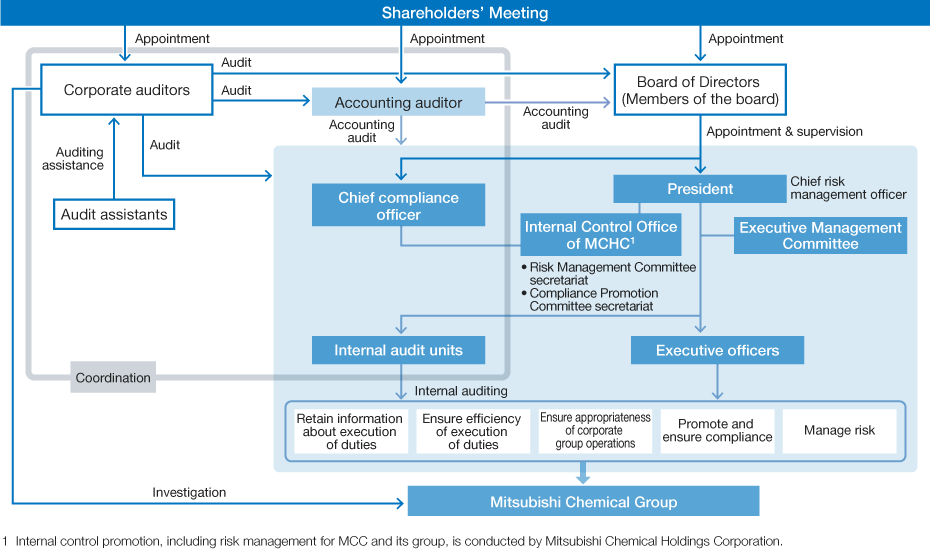Corporate Governance
The top priorities for corporate governance of the Mitsubishi Chemical (MCC) and its group companies are to ensure fast and efficient decision making and business execution, clarify management responsibilities, ensure compliance and strengthen risk management.
The MCC Group’s basic corporate governance structure is illustrated below. MCC has adopted an executive officer system to separate management and executive functions. Furthermore, MCC has defined the extent of the authority of such decision-making bodies as the Board of Directors and various management positions in its internal rules. Through these and other measures, MCC ensures proper, efficient managerial decision making and business execution.
Corporate Governance Structure of the Mitsubishi Chemical and its group companies
(as of June 21, 2021)

Board of Directors
The Board of Directors meets once a month in principle. In accordance with the regulations of the Board of Directors and other relevant rules, the board makes decisions on important managerial matters and basic matters concerning Group management and provides oversight of the execution of duties by directors. The six directors (four of whom concurrently serve as executive officers as of June 21, 2021) form a management structure capable of quickly adapting to environmental changes. To further clarify the managerial responsibilities and role of each director, the term of office for a director is one year. Human resources judged to possess the necessary skills and qualities to realize the Group’s corporate philosophy and fulfill its social responsibilities are selected as candidates for director by the Board of Directors. Candidates are then elected by a resolution of the Shareholders’ Meeting.
Executive Management Committee
The Executive Management Committee is an advisory body that assists the President in making decisions, deliberating important matters concerning business execution, such as the investment and financing activities of MCC and the MCC Group. Particularly important managerial matters deliberated by the Executive Management Committee are acted on only upon the resolution of the Board of Directors. The Executive Management Committee meets twice a month in principle. The committee comprises the President, the chief operating officers of the business domains, the supervising officers of the corporate function domains, the presidents of the regional headquarters and the general manager of the Corporate Planning Division. The members of the board and corporate auditors may also attend its meetings as needed.
Corporate Auditors
MCC has five corporate auditors to audit its activities (as of June 21, 2021). The corporate auditors attend Board of Directors, various committee and other important meetings, receive reports from members of the board and other relevant parties, investigate the status of the company’s business and property, and audit the execution of duties by members of the board. MCC does not have a Board of Corporate Auditors, but voluntarily maintains a Corporate Auditors Liaison Committee to facilitate coordination and cooperation among the corporate auditors. The Corporate Auditors Liaison Committee meets once a month in principle. At meetings, the corporate auditors discuss audit plans and other important audit-related matters. Corporate auditors, the accounting auditor and the Internal Audit Division work in close coordination, exchanging opinions on their respective audit processes and results.
Committees
The company maintains a number of committees, including the Compliance Promotion Committee, Risk Management Committee, Information Security Committee, Environmental and Safety Promotion Committee and Human Rights Due Diligence Committee. These committees refer or report important matters to the Board of Directors or the Executive Management Committee.

